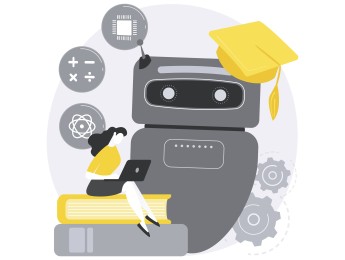The development of new technologies has greatly shaped the way humanity has evolved, and this change is never-ending as technology is constantly discovered. A newer technology that is growing increasingly popular is artificial intelligence. In many ways, artificial intelligence systems have already been implemented into our day-to-day lives, in ways that have most likely gone unnoticed.
However, from an organisation's perspective, artificial intelligence has made momentous improvements to business functions. Implementing an AI system can greatly increase cost-effectiveness, reduce the need for human employees, and maximise productivity.
Despite the sudden rise in use, artificial intelligence systems can be complex, so it is crucial that those involved in their development are highly competent on the principles, algorithms, clustering, and data classification. These factors are integral to an AI system, as they will dictate how effectively the system will be able to conduct its purpose.
AI can completely transform the modern world and how we carry out our lives. With constant improvements to the integral systems, their limitations are being erased. From an organizational perspective, it is important to understand the extent to which AI will be used and to find a safe balance between AI functions and human employees.
Upon completion of this course, participants will be able to:
- Understand the vitality of artificial intelligence in modern society.
- Identify potential areas where artificial intelligence can improve functions.
- Assess how artificial intelligence can increase an organisation’s cost-effectiveness and productivity, optimise resources and reduce risks.
- Analyse the concepts, principles, and processes of artificial intelligence.
- Effectively plan, design, implement and monitor an artificial intelligence system.
- Create an artificial intelligence system that is highly adaptable to external and internal influences of change.
- Examine various intelligent agents and how they can be integrated into the artificial intelligence system.
- Apply regression, classification, clustering, retrieval, recommender systems and deep learning processes.
This course is designed for anyone who wishes to develop their artificial intelligence knowledge. It would be most beneficial for:
- Artificial Intelligence Engineers
- Machine Learning Engineers
- Operations Managers
- Data Analysts
- IT Professionals
- Planning and Strategy Managers
- Project Managers
- Chief Information Officers (CIOs)
This course uses a variety of adult learning styles to aid full understanding and comprehension. Participants will investigate existing artificial intelligence systems to highlight key processes, algorithms, and intelligent agents.
They will be supplied with the tools and equipment necessary to successfully participate in the learning exercises. Combined with presentations, practical activities, and case studies, the participants will have the opportunity to develop a full and comprehensive understanding of the content taught. Participants will also be able to plan and design their own artificial intelligence systems related to their specific roles.
Day 5 of each course is reserved for a Q&A session, which may occur off-site. For 10-day courses, this also applies to day 10
Section 1: Introduction to Artificial Intelligence
- Understanding the basic principles and concepts of artificial intelligence.
- Describing the process of state space search.
- Graph theory and information of state space search.
- Assessing how state space search is an ideal method of problem-solving.
- Identifying how state space search is integral to the design and function of artificial intelligence systems.
- Hill climbing and minimax algorithms.
Section 2: Machine Learning
- The fundamentals of machine learning.
- Understanding the different types of information clustering – partitioning and hierarchical.
- Examining the benefits and limitations of the types of clustering.
- The various types of classification algorithms and how they are used – logistic regression, naïve byes, k-nearest neighbours, decision tree and support vector machines.
- How machine learning is integral to artificial intelligence.
Section 3: Decision Making
- Describing the purpose of an intelligent agent.
- Common uses for intelligent agents.
- Different types of intelligent agents – reflex, model based, goal based, utility based and learning agents.
- Utilising deep learning neural networks (DNN) and artificial neural networks (ANN) to mimic human intelligence.
- Identifying circumstances where it is best to use DNN or ANN.
Section 4: Genetic Algorithms and Fuzzy Logic
- Achieving maximum optimisation using genetic algorithms.
- Characteristics of a genetic algorithm - chromosomes, genes, selection, mutation, and crossover.
- Balancing fuzzy sets with fuzzy rules.
- Fuzzy logic vs probability.
Section 5: The Future of AI
- Common uses of AI in modern organisations.
- Analysing the past and present uses of AI to predict the future of AI development accurately.
- Evaluating whether AI is making human jobs in society redundant.
- The potential risks of standardising AI systems.
Upon successful completion of this training course, delegates will be awarded a Holistique Training Certificate of Completion. For those who attend and complete the online training course, a Holistique Training e-Certificate will be provided.
Holistique Training Certificates are accredited by the British Assessment Council (BAC) and The CPD Certification Service (CPD), and are certified under ISO 9001, ISO 21001, and ISO 29993 standards.
CPD credits for this course are granted by our Certificates and will be reflected on the Holistique Training Certificate of Completion. In accordance with the standards of The CPD Certification Service, one CPD credit is awarded per hour of course attendance. A maximum of 50 CPD credits can be claimed for any single course we currently offer.
- Course Code IND02-112
- Course Format Classroom, Online,
- Duration 5 days














